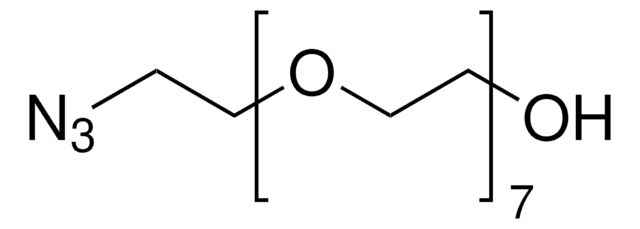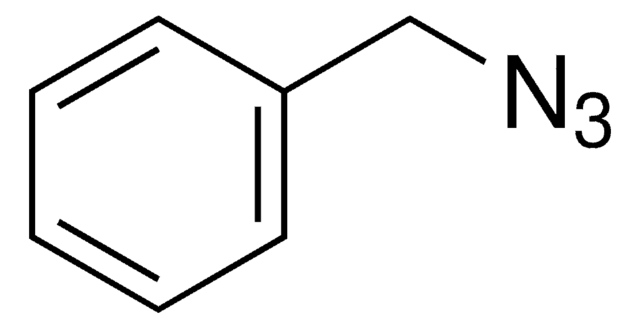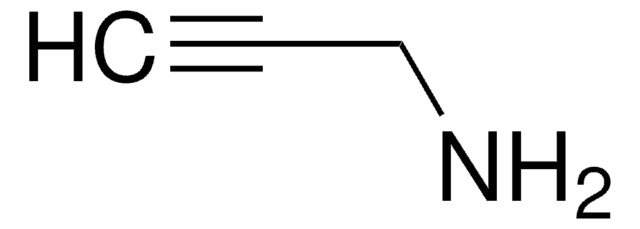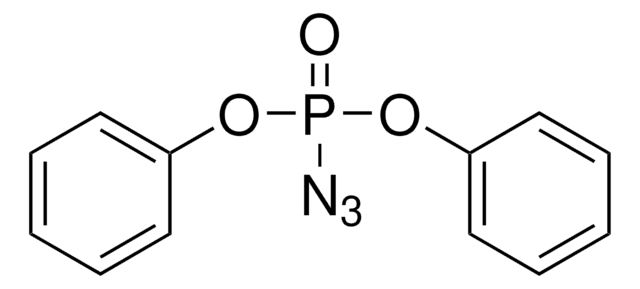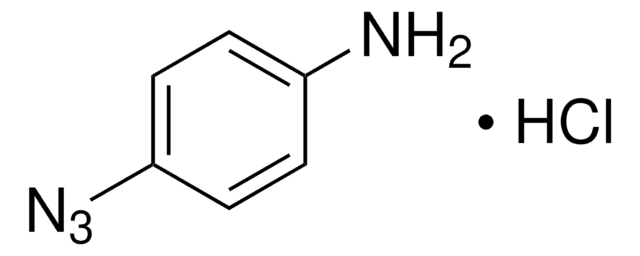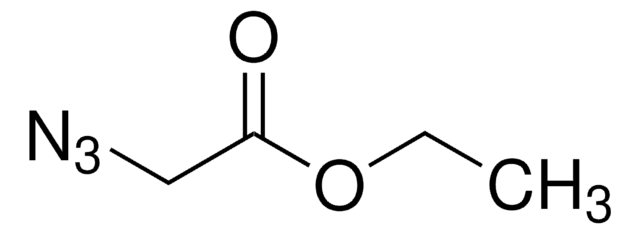776130
3-Azido-1-propanol
≥96%
Sinónimos:
1-Azidopropan-3-ol
Iniciar sesiónpara Ver la Fijación de precios por contrato y de la organización
About This Item
Fórmula empírica (notación de Hill):
C3H7N3O
Número de CAS:
Peso molecular:
101.11
MDL number:
UNSPSC Code:
12352125
PubChem Substance ID:
NACRES:
NA.22
Productos recomendados
Quality Level
assay
≥96%
form
liquid
reaction suitability
reaction type: click chemistry
refractive index
n20/D 1.461
density
1.095 g/mL at 25 °C
storage temp.
2-8°C
SMILES string
OCCCN=[N+]=[N-]
InChI
1S/C3H7N3O/c4-6-5-2-1-3-7/h7H,1-3H2
InChI key
WHVSIWLMCCGHFW-UHFFFAOYSA-N
Categorías relacionadas
General description
3-Azido-1-propanol is an azide-containing reagent utilized in Strain-Promoted Azide-Alkyne Cycloaddition reactions (SPAAC). This enables selective and copper-free click chemistry modifications of biomolecules.
Application
3-Azido-1-propanol is used as a:
- Precursor in the synthesis of heterocyclic compounds like dihydrooxazines
- Reagent in the synthesis of heterofunctional polyesters by 1,3-dipolar cycloaddition
Elija entre una de las versiones más recientes:
¿Ya tiene este producto?
Encuentre la documentación para los productos que ha comprado recientemente en la Biblioteca de documentos.
Los clientes también vieron
1, 3-Dipolar and Diels-Alder cycloaddition reactions on polyester backbones possessing internal electron-deficient alkyne moieties
M Cetin, et.al.
Polym. Chem., 7, 7094-7100 (2016)
Efficient synthesis of linear multifunctional poly (ethylene glycol) by copper (I)-catalyzed Huisgen 1, 3-dipolar cycloaddition
Liu X-M, et al.
Biomacromolecules, 8(9), 2653-2658 (2007)
1, 3-Dipolar and Diels-Alder cycloaddition reactions on polyester backbones possessing internal electron-deficient alkyne moieties
Cetin M, et al.
Polym. Chem., 7(46), 7094-7100 (2016)
Cross-linked polymer-blend gate dielectrics through thermal click chemistry
Li S, et al.
Chemistry?A European Journal, 21(49), 17762-17768 (2015)
Somayeh Khezrian et al.
Journal of biomedical materials research. Part A, 108(11), 2291-2304 (2020-05-05)
Active targeted nanotechnology-based drug delivery systems have gained significant favor because they have the ability to decrease side effects, improve drug bioavailability, and the potency of anticancer treatment. In this study, functional amphiphilic Janus nanoparticles (JNPs), consisting of hydrophilic and
Nuestro equipo de científicos tiene experiencia en todas las áreas de investigación: Ciencias de la vida, Ciencia de los materiales, Síntesis química, Cromatografía, Analítica y muchas otras.
Póngase en contacto con el Servicio técnico
![2-[2-(2-Azidoethoxy)ethoxy]ethanol solution ~0.5 M in tert-butyl methyl ether](/deepweb/assets/sigmaaldrich/product/structures/374/007/eea7ca74-41e4-4aac-af71-c93c37ec0a5a/640/eea7ca74-41e4-4aac-af71-c93c37ec0a5a.png)




